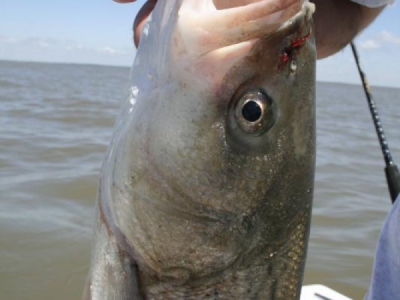
Posted on February 18, 2019
Striped bass regulations will be changing once the most recent stock assessment is peer reviewed. ERIC BURNLEY PHOTO
It seems that the dredging project for Massey’s Ditch will have to wait until November of this year to get underway.The Department of Natural Resources and Environmental Control did not receive an acceptable bid for the job and will have to begin the bidding process all over again.This means those of us who run boats between Rehoboth and Indian River bays will once again face the prospect of running aground trying to get through either the ditch or Baker’s Channel.
Ocean City, Md., also has shoaling problems at the inlet.It seems a commercial fishing boat ran aground there and was stuck for several hours.The town and the state have worked together to get the money, and the inlet will be dredged.
In Delaware, we have doubled the cost of our boat registration fee with all of that money going into a fund dedicated to maintaining our waterways.Unfortunately, that only accounts for $1.5 million of the $3 million required on an annual basis just to keep the channels open.
I know Sen. Gerald Hocker and Rep. Ronald Gray have been trying to find the funds we need to maintain our waterways, but to the best of my knowledge, they have not been successful.Perhaps things will change with this session of the Legislature.
Striped bass
The Atlantic States Marine Fisheries Commission met last week and was supposed to review the latest findings of the Striped Bass Stock Assessment.Unfortunately, due to the federal government shutdown, the peer review was not done, so the stock assessment could not be presented.However, the preliminary results did not look good.It appears the stock is overfished and overfishing is occurring.If the final assessment comes to the same conclusion, we can expect some drastic reduction in both recreational and commercial landings.
Another factor that is beginning to have an impact on the stock of striped bass is the release mortality.I have been concerned about this for many years after seeing the results firsthand of catch-and-release live bait fishing at the Chesapeake Bay Bridge-Tunnel during the summer.
Virginia does not have an open season on striped bass in the summer, but a few people would go out and use live spot to catch and release stripers over the tunnel tubes just for fun, or in one instance, to film a TV show.
Claude Bain, who was the chairman of the Virginia Saltwater Fishing Tournament at the time, and I would stay down current of the fishermen and count the dead stripers floating by.By a very rough estimate, we figured the mortality rate was around 90 percent.
Later, Claude and I went out with two scientists and caught and released large stripers on wire line during the late fall and winter.They took blood samples of the fish and could tell if the chance of survival was good or poor.With proper handling, the survival rate was excellent.
It seems when the water temperature is high, the release mortality is also high, but when the water temperature drops, the release mortality falls as well.Of course, there will have to be many more studies on this, but I think it would be a good idea to limit the number of released striped bass during times when the water temperature reaches 60 degrees or more.Let anglers have their two keepers, then stop fishing for stripers.
I have long believed that striped bass should be managed like red drum or channel bass.These fish have a slot limit somewhere between 24 and 30 inches with a bag limit of up to five fish per day, depending on the state regulations.I have seen firsthand the results of this management plan – acres and acres of giant red drum measuring between 45 and 55 inches willing to hit bucktails and surface plugs as fast as you can get the lures in the water.
While this does require catch and release, the best of this fishing is in the spring and fall when water temperatures are cooler.A completely closed season, with no catching or catch-and-release fishing during the summer, should take care of that warm-water mortality.
One thing does seem certain, the opening of the Exclusive Economic Zone to striped bass fishing will not happen, since overfishing is occurring and the striped bass stock is overfished.I am pleased that is the case and hope it continues to be so.
Finally, there will be calls from some recreational fishing groups to ban commercial fishing for striped bass.I am opposed to this and always have been.Why should only one group of the public have access to a public resource?If there are not enough striped bass for both of us, put on a moratorium until the stock recovers.

Eric Burnley is a Delaware native who has fished and hunted the state from an early age. Since 1978 he has written countless articles about hunting and fishing in Delaware and elsewhere along the Atlantic Coast. He has been the regional editor for Salt Water Sportsman, Field and Stream, Outdoor Life and the Fisherman Magazine. He was the founding editor of the Mid-Atlantic Fisherman magazine. Eric is the author of three books; Surf Fishing the Atlantic Coast, The Ultimate Guide to Striped Bass Fishing and Fishing Saltwater Baits. He and his wife Barbara live near Milton, Delaware. Eric can be reached at Eburnle@aol.com.
Source: Cape Gazette





